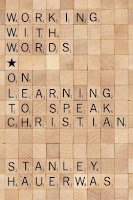--Stanley Hauerwas, Working With Words (p. 78)
...trudging into the distance in the bleeding stinking mad shadow of Jesus...the Lord out of dust had created him, had made him blood and nerve and mind, had made him to bleed and weep and think, and set him in a world of loss and fire... --Flannery O'Connor
4.23.2013
The Training That Refuses to Let Death Determine the Shape of Our Living
To learn to follow Jesus is the training necessary to become a human being. To be a human being is not a natural condition, but requires training. The kind of training required, moreover, has everything to do with death. To follow Jesus is to go with him to Jerusalem where he will be crucified. To follow Jesus, therefore, is to undergo a training that refuses to let death, even death at the hands of enemies, determine the shape of our living.

yes!
ReplyDeleteI've always liked what Hauerwas had to say.
ReplyDeleteHere's how a friend of mine reacted to the quote;
Jesus said of His own death:
"Verily, verily, I say unto you, Except a corn of wheat fall into the ground and die, it abideth alone: but if it die, it bringeth forth much fruit." (John 12:24)
The death He is describing here is not an execution, but merely the dormant stage of a transformational sequence. It is moving from one state to another. It is leaving the caterpillar to become the butterfly. The crucifixion did not kill Jesus. He Himself laid down his own mortal life at the proper time when all was accomplished, and entered into a dormant state so that He could burst forth later into resurrected life.
Christianity has taught us an execution mentality in regards to our spiritual death - in other words, it is the punishment we must inflict upon ourselves, the stake we must continually drive through our own hearts to rid ourselves of sin. It is violent, destructive, disfiguring.
In reality, spiritual death is simply a silent, empty interlude in a transformation - where we move from separation from God into oneness with the Divine. First, we "abide alone", living a life that feels separated from our One Love, calling out to Him as if He was far off in the distance. Then we enter into death by letting go of the cherished belief in our separateness and autonomy. This leaves us feeling empty. But in its emptiness, death makes room for an awakening into the experience of beautiful oneness with our Beloved - feeling Him all around us, in us and through us.
It is transformation, not execution, that Jesus invites us into.
Tom